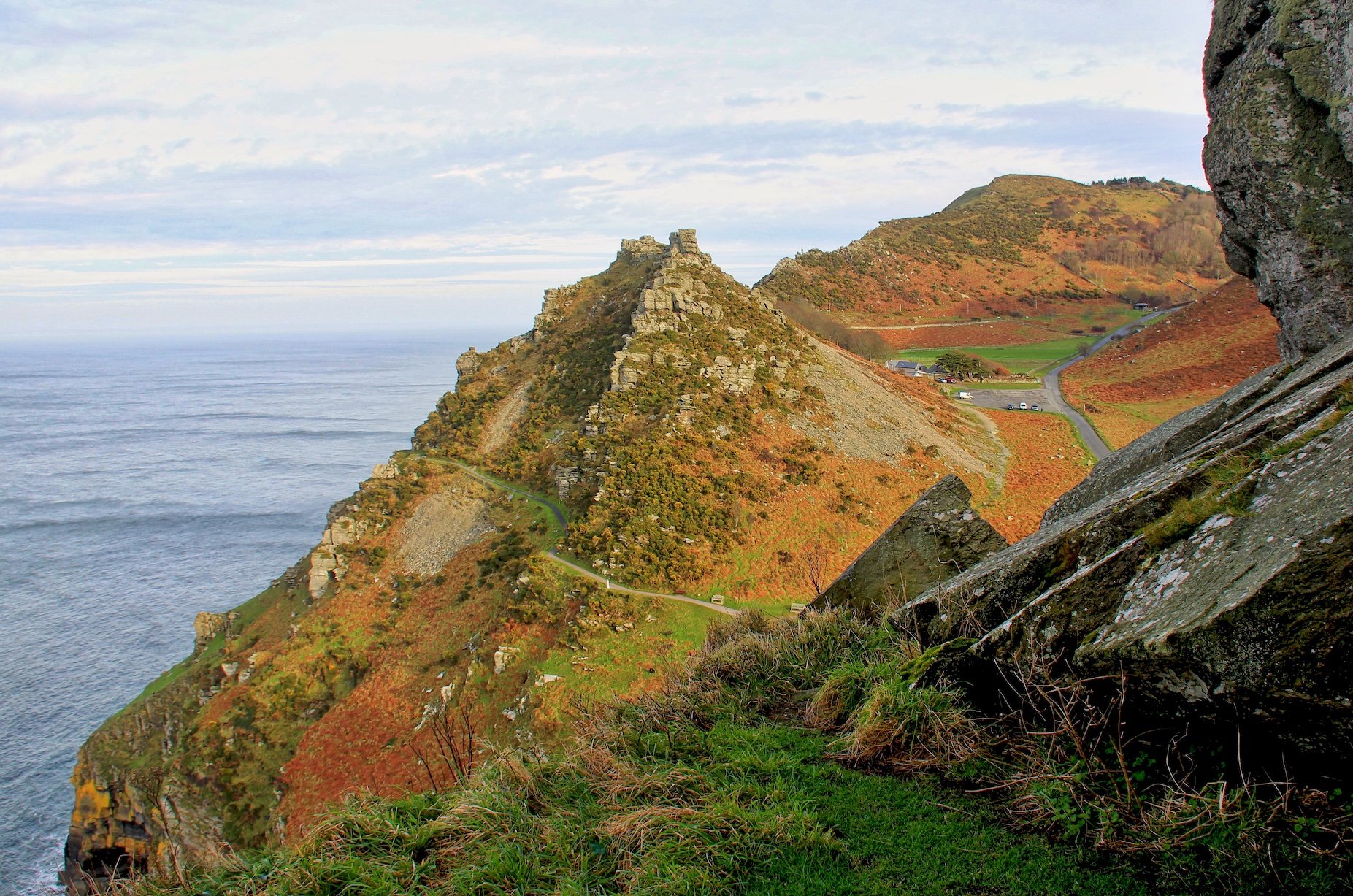Exmoor Walks: Lynton's Valley of Rocks
Discover the Enchanting Valley of Rocks: A Walk Through History and Natural Beauty ⛰️✨
Scrambling around in the Valley of Rocks
What can one say about the Valley of Rocks that has not been said before? This mystical landscape in North Devon has inspired countless visitors over the centuries. The poet Coleridge referred to the "commotion of the elements" here, while William and Dorothy Wordsworth called it "The Valley of Stones." R.D. Blackmore immortalized it as the setting for Mother Melldrum's cave in Lorna Doone, but it’s Robert Southey's poetic words that truly capture its essence: "The palace of pre-Adamite kings," containing "the very bones and skeleton of the earth."
Valley of Rocks seen from high above
The Valley of Rocks is a place where history, myth, and natural beauty converge. Its towering rock formations, jagged cliffs, and the ever-changing sky above make it a true gem of the West Country. It's no wonder poets and writers have been inspired by this dramatic landscape, where the raw beauty of nature feels almost timeless. Whether you're here for the literary connections or simply for the stunning scenery, the Valley of Rocks promises an unforgettable experience.
Valley of Rocks on a dark winter afternoon
A Journey to the Valley of Pre-Adamite Kings ⚡️
As I found myself in Lynton, having brought my son to play for the local football team, I decided to explore this timeless valley while the match unfolded. The Valley of Rocks, with its dramatic landscape, offers numerous public rights of way—the challenge lies in choosing which one to take. A footpath behind the football pitch caught my eye, one I’d never walked before, so I set off along its steep, perpendicular course.
To find the path, I walked a hundred yards or so from the playing field towards the Valley of Rocks, turned left, and took an unofficial track past Lynton's overflow cemetery. Above the gravestones, the climb steepened until I reached the main South Cleave path issuing from southern Lynton. As I climbed further, I reached a scenic bend high above the valley, and from there, I could survey both Lynton and the iconic Valley of Rocks. This path offers one of the West Country's most awe-inspiring aerial views—all while keeping your feet firmly on terra firma.
Cricket pavillion, Valley of Rocks
The feeling of standing at that height, with the valley stretching out below, is something hard to describe. The air is crisp, the wind is invigorating, and the panoramic views make you feel like you're on top of the world. It's moments like these that remind us why we venture out into nature—to find a sense of wonder and connection that is often missing in our daily lives.
A View Like No Other 🛩️
Looking west from the Valley of Rocks
As you round the corner, you’re greeted by a bird’s-eye view of the world's most dramatically positioned cricket pitch. Perched above Lynton, this wicket is one of the most photographed in England, second only to Lord's. The Valley of Rocks itself is unusual; it has no watercourse and runs parallel to the sea, rather than directly towards it. It’s believed that this valley once formed the main course for the Lyn rivers when sea levels were much higher.
Today, the valley's floor sits some 500 feet above the current sea level. It’s easy to imagine the ancient waves and rivers carving their path through this land, giving rise to the mysterious valley we see today. One can't help but ponder if, when the next ice cap melts, the pre-Adamite kings might be awakened by saltwater once more.
Devil’s Cheese-wring, Valley of Rocks
The geology of the Valley of Rocks is fascinating, with its layers of sandstone and quartzite revealing the story of millions of years of Earth's history. The valley's rock formations have been shaped by the forces of wind and weather, giving them their unique, almost otherworldly appearance. As you explore, it's easy to see why the landscape has inspired so much folklore and legend—there's an undeniable sense of magic here.
From Lee Abbey to the Devil’s Cheese-ring 🧀
After enjoying the spectacular view from South Cleave, I continued towards Lee Bay. To descend from the path's 1,000-foot heights, a series of zigs and zags brought me to woodland near Lee Abbey. At Six Acre Wood, there’s a choice: either head down to the abbey itself or continue through the trees into Caffyns Heanton Wood.
Spot the goat, sea cliffs at the Valley of Rocks
Lee Abbey itself is a tranquil retreat, with its beautiful gardens and historic buildings providing a sense of peace and reflection. The abbey, which serves as a Christian retreat, is nestled in the valley and surrounded by lush woodland, making it a perfect place for those seeking solace in nature. As I walked through the grounds, I couldn't help but feel a sense of calm—a stark contrast to the rugged wildness of the valley above.
From Lee, the toll road doubles as part of the South West Coast Path, eventually bringing me to the centre of the Valley of Rocks. On quieter days, it’s a pleasant walk, though in summer the road can become frustratingly busy. Here, I paused to pay my respects to Mother Melldrum, who is said to still lurk among the rocks of the Devil's Cheese-ring. This towering stack of stone, though dwarfed by the surrounding cliffs, is the legendary winter home of R.D. Blackmore’s old witch.
Choice of footpaths at the Valley of Rocks
The Devil's Cheese-ring is one of the valley's most iconic features—a massive stack of rock that seems to defy gravity. It's easy to see why Blackmore chose this spot for his fictional witch; there's something eerie and mysterious about the way the rocks are piled, as if placed there by some ancient force. For those brave enough to scramble up to it, the Cheese-ring offers a closer look at the valley's geological wonders and a chance to feel the raw power of nature.
Practical Information for Your Adventure 🌍🚶♂️
Basic Hike: From Lynton, over South Cleave to Lee Abbey, and back via the toll road and Valley of Rocks paths.
Recommended Map: Ordnance Survey OL9 – Exmoor.
Distance & Terrain: Approximately four miles; expect steep sections.
Best Time to Visit: Spring and autumn offer the best weather for hiking, with fewer crowds and cooler temperatures.
What to Bring: Good walking boots, plenty of water, and a camera to capture the stunning views.
Looking up the Valley of Rocks
Whether you're inspired by poetry, literature, or the sheer beauty of this ancient landscape, the Valley of Rocks never fails to enchant. Its combination of dramatic scenery, rich history, and peaceful spots for reflection makes it a destination that offers something for everyone. From the thrill of standing on a high cliff to the quiet beauty of Lee Abbey, every corner of the valley has a story to tell.
Ready for your own adventure? The Valley of Rocks awaits, with its timeless beauty and enchanting tales. Whether you're an avid hiker, a history enthusiast, or simply someone looking to escape the hustle and bustle of everyday life, this magical place will leave you with memories to cherish. So lace up your boots, grab your map, and set off on a journey through one of North Devon's most captivating landscapes.
Every view spectacular: Valley of Rocks















